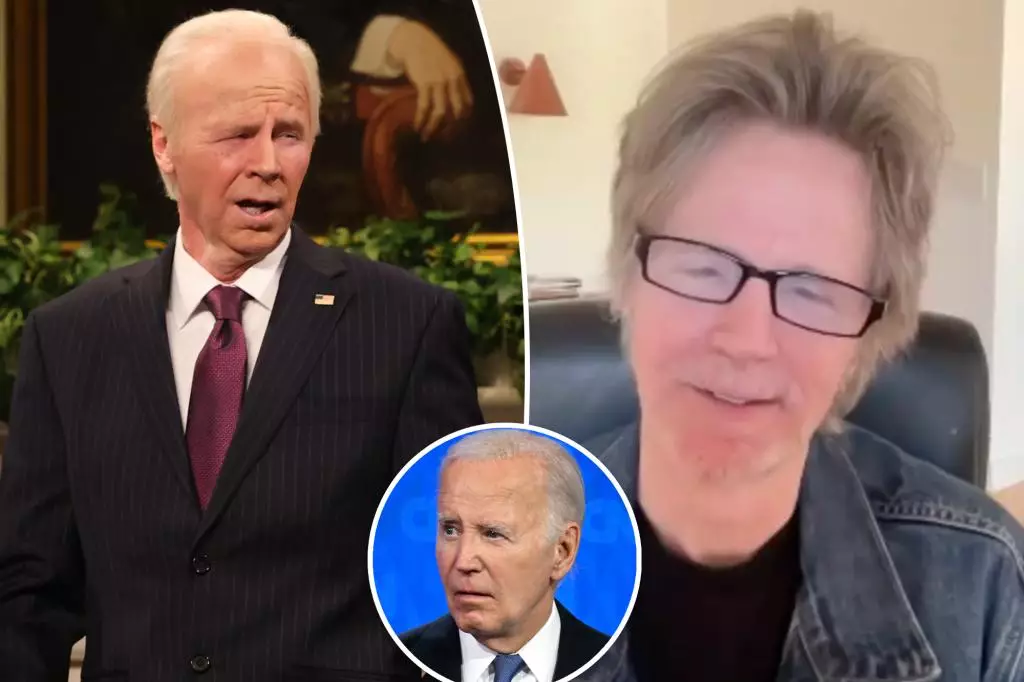Dana Carvey’s return to the iconic sketch show “Saturday Night Live” (SNL) is not just about a comedic revival; it reflects the interplay of comedy, politics, and personal commitment. In a recent interview, Carvey candidly discussed the circumstances surrounding his highly anticipated stint impersonating President Joe Biden. His decision to engage in this renewed role came at the behest of the show’s influential creator, Lorne Michaels. Carvey humorously recounted Michaels’ sales pitch for his return: an enchanting six-week engagement in the heart of New York City, a vibrant terrain where laughter and politics intertwine.
Yet, amid the initial excitement loomed an uncertainty inherent to political comedy. Carvey foresaw a shift when Biden seemingly faltered during a critical debate against now-President Donald Trump. This pivotal moment, coupled with Biden’s subsequent withdrawal from the presidential race, prompted Carvey to predict that his time in New York was effectively over. “We’re not going to New York,” he confided to his wife during the debate, marking a moment of prophetic clarity that would shape his comedic trajectory.
Embodying Humor Through Nuanced Imitation
Carvey’s approach to embodying Biden is distinguished by a commitment to portray the figure with nuance, rather than ridicule. His impersonation involved fun idiosyncrasies that endeared and entertained rather than alienated. Providing depth to his performance, Carvey described his characteristic gestures, which included the endearing scratching of Biden’s face and playful antics like picking up “toys on the carpet.” Such moments showcase Carvey’s unique ability to generate humor while respecting the essence of his characters—an ethos that should guide all political impersonations.
In his reflections, Carvey emphasized that his goal was not to diminish or belittle the subjects of his comedy. “I’m not trying to really make political points or put them down; I’m trying to find what is fun about them,” he stated. This principle of kindness in humor is a crucial aspect of his craft, and it elevates his work from mere imitation to insightful commentary. By avoiding cruel jabs, Carvey champions a model of comedy that provides levity and encourages laughter—an important counterbalance in these polarized times.
Reflections on Presidential Comedy
Interestingly, Carvey’s experience is not limited to Biden; he cut his comedic teeth during the George H.W. Bush presidency. Carvey’s portrayal of Bush was so well-received that it earned him unexpected accolades, including an invitation to the White House after Bush’s loss in the 1992 election. “He calls me out of the blue in December,” Carvey recalled, revealing the intrinsic bond formed through shared laughter. His anecdote not only highlights the camaraderie created by comedy but also demonstrates how humor can bridge divides, even in contexts as politically charged as the White House.
Carvey’s adventures in political spoofing showcase the evolving landscape of comedy and its interplay with public life. A significant takeaway from his experiences is that comedy offers a mirror through which society can examine itself. It reveals truths, encapsulates public sentiment, and reflects human flaws—all while fostering connection through shared chuckles.
The Legacy of Impersonation in Contemporary Comedy
As Carvey continues to explore his comedic roots through projects like his podcast with David Spade, he represents a lineage of entertainers who have managed to infuse humor into our collective narratives around politics. His reflections serve as a reminder that, even amidst the chaos of political discourse, humor can provide clarity, connection, and even healing. In a world increasingly defined by division, the type of humane satire that Carvey embodies stands as a beacon of hope, reminding us of the laughter that links us all, regardless of our political affiliations.
In an era where the boundaries of comedy and real-life implications increasingly intersect, Carvey’s ability to tread lightly while delivering sharp, thought-provoking humor puts him at the forefront of a necessary dialogue. His legacy is not just in the impersonations themselves, but in his ability to invoke empathy through laughter, reminding us that comedy need not be cruel to be impactful.

